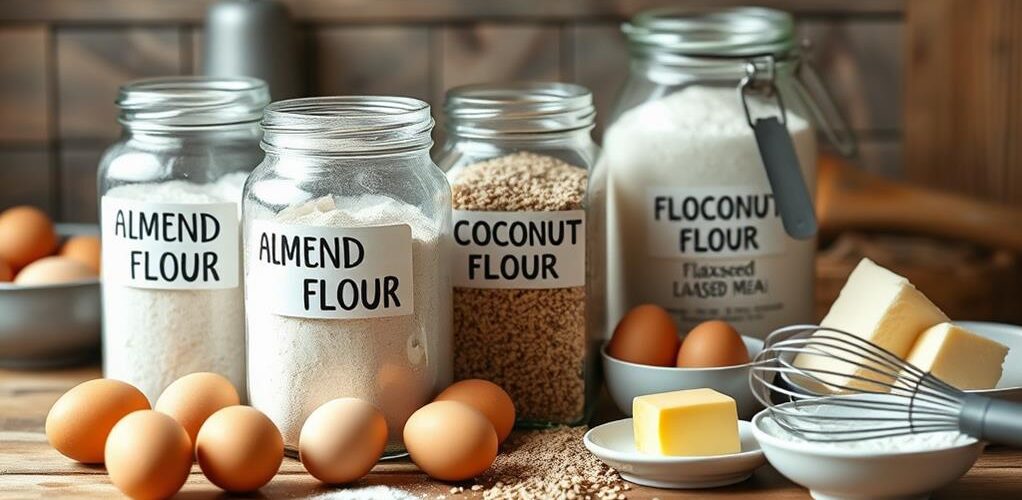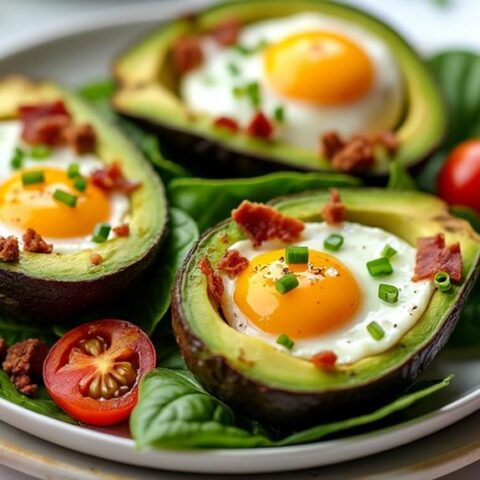
Starting a keto diet but missing your favorite bread and muffins? Fear not! With awesome flour alternatives like almond flour, coconut flour, and flaxseed meal, keto baking becomes a delicious adventure. Almond flour is nutty and moist, coconut flour is full of fiber but needs extra liquid, and flaxseed meal can even replace eggs! Psyllium husk powder is a game-changer for texture in bread, and chia flour adds a boost of fiber with zero net carbs. Balancing these flours keeps your keto treats tasty without skyrocketing carbs. Ready to make your keto kitchen a bakery? Let's explore more yummy details ahead!
Key Takeaways
- Almond flour is a versatile keto-friendly substitute, offering a nutty flavor with only 1g net carb per 2 tablespoons.
- Coconut flour is high in fiber but requires extra liquids in recipes to avoid dense baked goods.
- Flaxseed meal is an excellent egg substitute in keto baking, providing 0g net carbs and omega-3 fatty acids.
- Psyllium husk powder enhances texture in keto bread and pizza crusts, with just 1g net carb per tablespoon.
- Chia flour is high in soluble fiber and best used in combination with other keto flours for optimal texture.
Keto Diet Overview
The keto diet, characterized by its low-carb, high-fat approach, necessitates significant dietary adjustments, including the removal of traditional flour-based foods such as bread, pasta, and crackers. This can sound pretty scary at first, but don't worry; it's totally manageable with some smart keto meal planning.
The main idea behind the keto diet is to get your body into ketosis, a state where it burns fat for energy instead of carbohydrates. This can lead to weight loss and even improve your metabolic health.
One of the trickiest parts is finding the right keto snack options and substitutes for high-carb foods. You'll need to say goodbye to your usual flour-based goodies, but hello to some exciting alternatives. For example, almond flour is a favorite in the keto community because it has only 3 grams of total carbs and 1 gram of net carbs per two tablespoons. Coconut flour is another great option, with 9 grams of total carbs and 4 grams of net carbs per two tablespoons.
Mastering keto baking takes a bit of experimentation. Each type of low-carb flour has unique properties, so be ready for some kitchen adventures to nail the perfect texture and flavor.
Top Keto Flours
Diving into the world of keto baking reveals a variety of flour alternatives that cater to low-carb needs while still delivering great taste and texture.
Among the top contenders, almond flour shines with its 3g total carbs and 1g net carbs per 2 tablespoons. Rich in healthy fats, it can seamlessly substitute wheat flour 1-to-1 in most recipes, making it a versatile choice for keto baking.
Coconut flour is another favorite, boasting 9g total carbs and 4g net carbs per 2 tablespoons. However, it's a moisture magnet, absorbing liquids more than other flours. This means baking techniques need adjustments, like increasing liquid ingredients, to achieve the right consistency.
Flaxseed meal offers impressive nutritional benefits with 4g total carbs and 0g net carbs per 2 tablespoons. High in omega-3 fatty acids, it's also a popular egg substitute in keto recipes.
Psyllium husk powder, with 8g total carbs but only 1g net carbs per tablespoon, provides excellent fiber content, enhancing the texture of baked goods, especially bread.
Lastly, chia flour delivers 5g total carbs and 0g net carbs per 2 tablespoons. High in soluble fiber, it's often mixed with other flours to boost both the nutritional profile and texture of keto baked goods.
Baking Recipes
Exploring keto baking recipes reveals a myriad of options that cater to low-carb diets without sacrificing flavor or texture. One standout is the Almond Flour Chocolate Chip Cookies, which offer a delicious treat with only 2.3g net carbs per cookie. Their rich, buttery flavor makes them a favorite among cookie variations.
Coconut Flour Muffins are another excellent choice. Due to the absorbent nature of coconut flour, these muffins are incredibly high in fiber and require extra liquids for the perfect consistency. Each muffin contains around 2.1g net carbs.
Experimenting with various muffin toppings, such as keto-friendly berries or nuts, can add delightful texture and flavor.
For those seeking a bread alternative, Flaxseed Meal Bread is a nutritious option rich in omega-3 fatty acids. This low-carb bread is perfect for sandwiches or toast.
If pizza is more your style, a Keto Pizza Crust made from almond flour and psyllium husk offers a bread-like texture, creating a satisfying base for your favorite toppings.
Nutritional Insights
Understanding the nutritional profiles of keto baking ingredients is essential for creating delicious and health-conscious recipes.
Keto flours and alternatives offer unique nutritional benefits, making them ideal for low-carb baking. Here are some key insights:
1. Almond Flour: With about 3g net carbs per 2 tablespoons, almond flour is a low-carb option rich in healthy fats and vitamin E.
It's great for adding a nutty flavor and moisture to baked goods.
2. Coconut Flour: Coconut flour contains 4g net carbs per 2 tablespoons, but its high dietary fiber content helps with digestion.
It absorbs more moisture, so recipes need more liquid adjustments.
3. Flaxseed Meal: This powerhouse boasts 0g net carbs per 2 tablespoons and is packed with omega-3 fatty acids.
It's not only nutritious but also a versatile egg substitute in vegan keto recipes.
4. Psyllium Husk Powder: Adding just 1g net carbs per tablespoon, psyllium husk powder enhances the texture of baked goods.
It's often used with other low-carb flours to achieve the best consistency.
These ingredients not only help in keeping carb counts low but also offer substantial nutritional benefits.
Incorporating them into your keto baking can make your recipes both delicious and health-conscious.
Health Considerations
When incorporating keto baking products into your diet, it's essential to reflect on their health impacts beyond just their carbohydrate content. While almond and coconut flours are excellent for weight management and low blood sugar levels, they come with their own set of health considerations.
Almond flour, boasting about 3g net carbs per 2 tablespoons, is packed with healthy fats and vitamin E. However, portion control is vital. Overconsumption can lead to high calorie intake and digestive discomfort, putting a damper on your keto journey.
Coconut flour, rich in fiber, is another great option but absorbs more moisture. This means you'll need more liquid ingredients in your recipes, which can make your baked goods denser if not adjusted correctly.
Flaxseed meal, with 0g net carbs per 2 tablespoons, is a powerhouse of omega-3 fatty acids. It's fantastic for heart health, adding not just low carbs but also a boost of essential nutrients to your keto baking.
However, neglecting portion control can lead to digestive health issues. Eating too much flaxseed meal can cause bloating and gas, making it important to balance your intake.
Frequently Asked Questions
What Is the Best Flour Substitute for Keto?
The best flour substitute for keto is almond flour due to its low carb content and versatile almond flour benefits. Coconut flour uses are also notable, but require recipe adjustments due to its high moisture absorption.
Which Flour Has the Lowest Carbs?
Flaxseed meal and chia flour, each containing 0g net carbs per 2 tablespoons, are the lowest-carb options. Despite this, almond flour offers additional benefits and coconut flour's versatility makes them favorable choices in keto baking.
How Can I Thicken My Keto Without Flour?
To thicken your keto recipes without flour, consider using keto thickeners like xanthan gum, guar gum, chia seeds, psyllium husk powder, or pureed low-carb vegetables. These thickening techniques guarantee low-carb, nutrient-rich results.
What Can I Use Instead of Baking Powder on Keto?
For a keto-friendly alternative to baking powder, use a combination of baking soda and cream of tartar. The recommended ratio is 1 teaspoon of baking powder equals 1/4 teaspoon of baking soda plus 1/2 teaspoon of cream of tartar.
Conclusion
In summary, the exploration of keto-friendly baking products, particularly flour alternatives, reveals significant benefits and culinary possibilities. Such alternatives offer valuable nutritional profiles and contribute meaningfully to dietary adherence within a ketogenic framework. Additionally, understanding the intricacies of these products aids in the creation of diverse and palatable recipes. Consequently, adopting these keto baking products can facilitate health maintenance and enhance culinary experiences for individuals adhering to a low-carbohydrate, high-fat dietary regimen.










No Comments